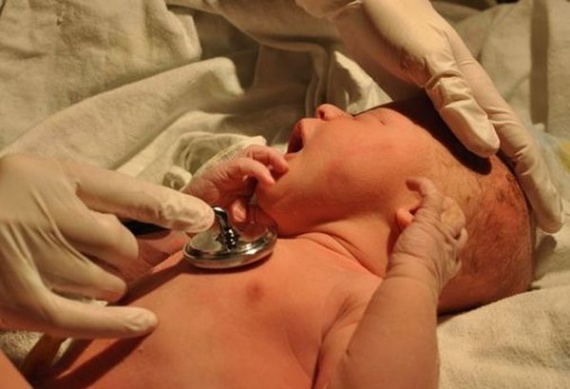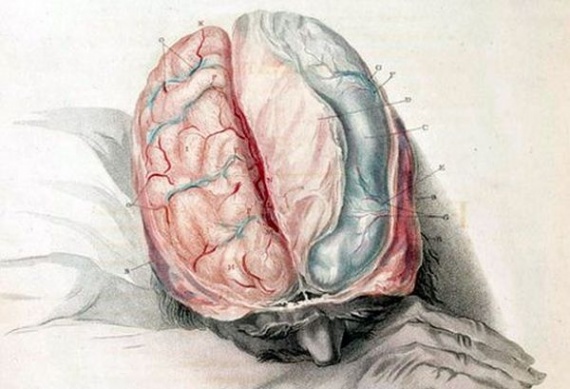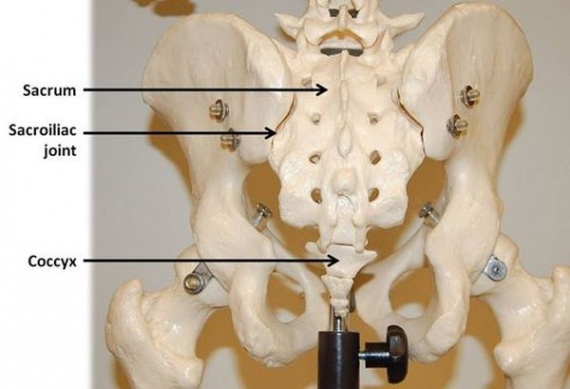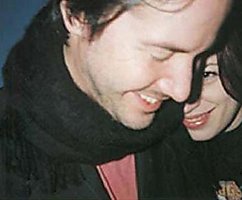Interesting facts about the man (12 photos)
 Bashny.Net
Bashny.Net
Hurricane sneezing
When you sneeze, the average speed of the air flight from your mouth is about 165 km / h. It is not surprising that your mother taught you to cover your mouth when you sneeze. After all, with such a furious pace with air spread bacteria. And if you sneeze without covering his mouth, in a radius of 5 meters from you will be a cloud of bacteria.

Fight to the last

Over a lifetime, the human heart will have time to cut about 3 billion times, provided that the average life expectancy of 70 years. It's quite a lot of work for a little muscle the size of a fist to a child and two adult fist.
Any good smile

As it turned out, not only pleasant smile than to frown, but namnogolegche. In the literal sense of the word. When a person smiles, it uses 2 times less muscle than when frowning. Therefore, make life easier - smile. Even if feigned smile, smiling, the brain produces hormones of happiness - endorphins that make you happy
Human skin

You can throw your antibacterial soap. Your skin produces antibacterial chemicals, not to allow germs to breed. Not only will your skin is a physical barrier to infection, it also produces a special antibacterial peptides, which protect the skin from infection itself. In addition, our physical barrier is constantly updated. The complete cycle of renewal of skin cells is between 26 to 28 days
Slyunomashina

Your body produces two to six cups of saliva per day. For life expectancy, it is enough to fill two small pools.
Lightweight and tennis

Every day through human lungs passes of 10, 000 liters of air. The total surface of the lungs is comparable to the size of a tennis court. As such a large space can fit in such a small amount? With 300 million alveoli (small bubbles) in each lung. The volume of the right lung more than the left.
Language identifier

Everyone has their own individual stamp of language - like fingerprints. But do not expect that when you are brought in for questioning, you will take an imprint of the language. It's much more complicated than a finger print. By the way cows, analogue of fingerprints is an imprint of the nose.
Steel belly

Your stomach produces hydrochloric acid - a substance which can cause severe burns and are used in industry as a chemical reagent. The acid is needed to digest food, but for some reason it does not corrode the stomach? The stomach has a mucous membrane that protects all the internal organs of the acid. Stomach mucosa updates about every two weeks, otherwise it will digest itself.
Brain power

Your brain - energy guzzler. Despite the fact that the brain is about 2% of total body weight, it consumes more than 20% of the energy of your body. Unlike your muscles or digestive system, your brain never rests - even when you sleep. Interestingly, the brain can be trained as a normal muscle - for this you just have to load the brain difficult puzzles. It is best to help communicate with people smarter or learning a new field of knowledge.
Tail

The man has a tail (with someone longer, and someone shorter). It is called the tailbone - a small bone at the end of the human spine, which was formed by the merging of 3 or 5 vertebrae. Typically, the coccyx of a few centimeters in length, and can not be felt and seen. But in some cases there are deviations when people have a visible tail.
Racing nerves

The speed of transmission of nerve impulses can reach 402 km / h, which is very convenient when you need to make a decision in a fraction of seconds. For example, to draw back his hand from the hot iron - all of this is due to chemical messages traveling between neurons (for solutions) and between neurons and muscle cells (in the case of motion)
Super strength

Your brain - is all that stands between you and a super-power. This phenomenon, also known as "hysterical strength" - a phenomenon that enables small and fragile woman lifts the whole car at the time when the choice is between life and death. Brain allows the muscles to tap their full potential and running at full capacity, increasing the effect of the release of adrenaline, which slows down nonessential functions of the body (eg digestion) and increases the frequency of breathing and heartbeat, as well as forwards all available free and the energy back on track. Therefore, people in moments of extreme danger are capable of incredible feats that can save them zhizn.Istochnik:
When you sneeze, the average speed of the air flight from your mouth is about 165 km / h. It is not surprising that your mother taught you to cover your mouth when you sneeze. After all, with such a furious pace with air spread bacteria. And if you sneeze without covering his mouth, in a radius of 5 meters from you will be a cloud of bacteria.

Fight to the last

Over a lifetime, the human heart will have time to cut about 3 billion times, provided that the average life expectancy of 70 years. It's quite a lot of work for a little muscle the size of a fist to a child and two adult fist.
Any good smile

As it turned out, not only pleasant smile than to frown, but namnogolegche. In the literal sense of the word. When a person smiles, it uses 2 times less muscle than when frowning. Therefore, make life easier - smile. Even if feigned smile, smiling, the brain produces hormones of happiness - endorphins that make you happy
Human skin

You can throw your antibacterial soap. Your skin produces antibacterial chemicals, not to allow germs to breed. Not only will your skin is a physical barrier to infection, it also produces a special antibacterial peptides, which protect the skin from infection itself. In addition, our physical barrier is constantly updated. The complete cycle of renewal of skin cells is between 26 to 28 days
Slyunomashina

Your body produces two to six cups of saliva per day. For life expectancy, it is enough to fill two small pools.
Lightweight and tennis

Every day through human lungs passes of 10, 000 liters of air. The total surface of the lungs is comparable to the size of a tennis court. As such a large space can fit in such a small amount? With 300 million alveoli (small bubbles) in each lung. The volume of the right lung more than the left.
Language identifier

Everyone has their own individual stamp of language - like fingerprints. But do not expect that when you are brought in for questioning, you will take an imprint of the language. It's much more complicated than a finger print. By the way cows, analogue of fingerprints is an imprint of the nose.
Steel belly

Your stomach produces hydrochloric acid - a substance which can cause severe burns and are used in industry as a chemical reagent. The acid is needed to digest food, but for some reason it does not corrode the stomach? The stomach has a mucous membrane that protects all the internal organs of the acid. Stomach mucosa updates about every two weeks, otherwise it will digest itself.
Brain power

Your brain - energy guzzler. Despite the fact that the brain is about 2% of total body weight, it consumes more than 20% of the energy of your body. Unlike your muscles or digestive system, your brain never rests - even when you sleep. Interestingly, the brain can be trained as a normal muscle - for this you just have to load the brain difficult puzzles. It is best to help communicate with people smarter or learning a new field of knowledge.
Tail

The man has a tail (with someone longer, and someone shorter). It is called the tailbone - a small bone at the end of the human spine, which was formed by the merging of 3 or 5 vertebrae. Typically, the coccyx of a few centimeters in length, and can not be felt and seen. But in some cases there are deviations when people have a visible tail.
Racing nerves

The speed of transmission of nerve impulses can reach 402 km / h, which is very convenient when you need to make a decision in a fraction of seconds. For example, to draw back his hand from the hot iron - all of this is due to chemical messages traveling between neurons (for solutions) and between neurons and muscle cells (in the case of motion)
Super strength

Your brain - is all that stands between you and a super-power. This phenomenon, also known as "hysterical strength" - a phenomenon that enables small and fragile woman lifts the whole car at the time when the choice is between life and death. Brain allows the muscles to tap their full potential and running at full capacity, increasing the effect of the release of adrenaline, which slows down nonessential functions of the body (eg digestion) and increases the frequency of breathing and heartbeat, as well as forwards all available free and the energy back on track. Therefore, people in moments of extreme danger are capable of incredible feats that can save them zhizn.Istochnik:
Tags
See also
Ten interesting facts about kinship surrounding flora and fauna (10 photos)
Rhinoceros. Interesting facts about the amazing animals (10 photos)
Ten interesting facts about kinship surrounding flora and fauna (10 photos)
Interesting facts and records streets in the world (27 photos)
40 interesting facts about tigers (4 photos)
10 facts about the Black Sea (11 photos)
Cognitive facts about famous cities (19 photos)
10 facts about what is made of modern cosmetics (11 photos)
13 interesting geographical facts (13 photos)
18 informative facts about the brain (18 photos)
















